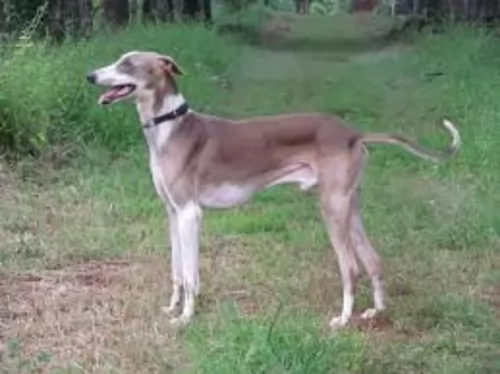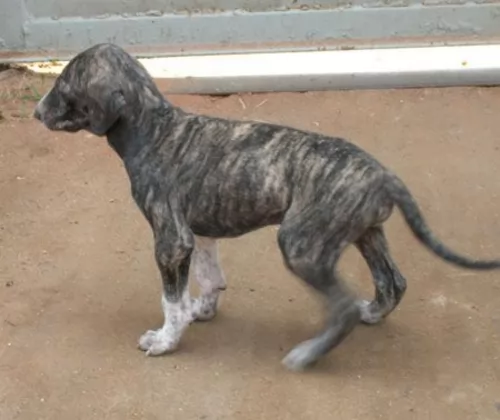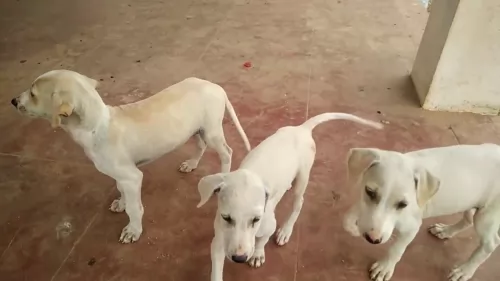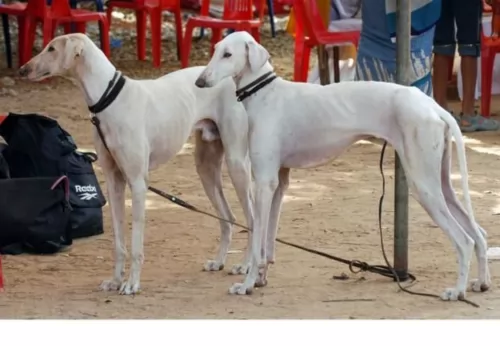 Petzlover
PetzloverMudhol Hound is originated from India but Turnspit Dog is originated from United Kingdom. Mudhol Hound may grow 42 cm / 17 inches higher than Turnspit Dog. Mudhol Hound may weigh 13 kg / 29 pounds more than Turnspit Dog. Both Mudhol Hound and Turnspit Dog has almost same life span. Mudhol Hound may have more litter size than Turnspit Dog. Mudhol Hound requires Moderate Maintenance. But Turnspit Dog requires Low Maintenance
 This seems to be the breed of many names. The Mudhol Hound comes from India and has been called the Caravan Hound, the Pashmi, the Karvanit, the Karwaani and the Pisuri Hound. Like so many other Indian breeds, the Mudhol Hound bears a strong look of the Greyhound. He is a sight hound and as such is lean and fast. He is ancient, healthy and loves his people.
This seems to be the breed of many names. The Mudhol Hound comes from India and has been called the Caravan Hound, the Pashmi, the Karvanit, the Karwaani and the Pisuri Hound. Like so many other Indian breeds, the Mudhol Hound bears a strong look of the Greyhound. He is a sight hound and as such is lean and fast. He is ancient, healthy and loves his people.
The ancestors of the Mudhol include the hounds bred by the tribes of Bedar near Mudhol and Halagali. In Maharashtra the Maratha warriors were also breeding hounds which are included in the Mudhol Hound lineage. It is believed that there is Tazi and Saluki heritage in the Mudhol as well.
All of these Indian hounds were good at guarding, hunting and as companions. Then the King of Mudhol began to breed them specially for hunting and succeeded in developing a sleek, slender dog. The King of England at the time, George V, was so impressed he dubbed them the Hounds of Mudhol.
The Mudhol Hound hunts rabbits and other small animals with their incredible sight. No matter if the breed was on a postage stamp in 2005 and is a great family companion, it is first and foremost a working dog. He was specifically bred for the tough working conditions in the mountains of India. They are courageous, loyal and graceful. They are committed to their people but a little standoffish with anyone else and make good guard dogs.
They were used by the Indian Army as border protection and surveillance dogs. They use them for testing of their veterinary corps. They have been deployed by the Army in Kashmir and Jammu in 2017, just as they were centuries ago. They were effective at taking down soldiers and horses alike.
They were also chosen for breeding at the Canine Research and Information Centre, part of the Karnataka Veterinary, Animal and Fisheries Sciences University in Bidar. With a very high prey drive they can get along with other dogs their size but cannot be trusted with smaller pets.
The Indian National Kennel Club lists them as the Mudhol Hound while the Kennel Club of India recognizes them as the Caravan Hound.
It is amazing that this small dog’s popularity comes from him being used in the kitchens to roast meat. The British enjoyed eating their meat which they roasted on a fire.
These dogs were essentially regarded as a tool – a means to an end, and when kitchens were modernized, they were no longer needed, and they became extinct.
Referred to as the kitchen dog or cooking dog, the first mention of these little dogs was made in 1576. By 1850 the dogs had become scarce and by 1900 it seemed as though there were none left.
 The Mudhol Hound is a good looking sight hound. Slender, sleek, muscular. They have narrow, long heads with a muzzle that tapers. They have long and powerful jaws with a large black nose. Their eyes are oval, large and brown with a look that pierces, and they have long, muscular, and clean shoulders. The legs are straight, long and strong with a broad, muscular, long back. Like most sight hounds when you seen them coming at you straight on, they have the appearance of being one dimensional.
The Mudhol Hound is a good looking sight hound. Slender, sleek, muscular. They have narrow, long heads with a muzzle that tapers. They have long and powerful jaws with a large black nose. Their eyes are oval, large and brown with a look that pierces, and they have long, muscular, and clean shoulders. The legs are straight, long and strong with a broad, muscular, long back. Like most sight hounds when you seen them coming at you straight on, they have the appearance of being one dimensional.
There are two types of coat and many acceptable colors. The coat can be silky on the tail, legs and ears or it can be completely smooth from head to toe. The coat can be grey, black, cream, red, fallow, and fawn. It can also be one of these colors and a small amount of shite blended it.
The Turnspit was a small long-bodied dog, standing at between 20 to 30cm in height and probably weighed anything between 9 and 14kg in height.
The legs were somewhat crooked or bandy and Edward Jesse, who wrote ‘Anecdote of Dogs’ in 1846 described them as ugly dogs with a miserable look to them. That was probably due to him having to fit into the hamster-like wheel contraption that turned the meat being roasted in the kitchens.
They were low-bodied dogs, similar to a Dachshund or a Corgi with short, stocky legs, short floppy ears, and a short coat. The long tail curled over its back. It is believed that the coats were white, reddish-brown, gray or black.
The dog was certainly feisty, energetic and hard-working with not much being written about his temperament. He was a working dog, but given the chance, he would no doubt have been loving and loyal, longing for the chance just to be part of a human family and to be loved.
The Turnspit dog had a tough life, but would no doubt have made a wonderful little pet had he just been allowed to be a companion dog.
Make sure that when you buy a dog, you don't just put him in your backyard and forget about him. Give him the love and care he deserves.
 Like so many of the old breeds raised in a lot of isolation, the Mudhol is a very healthy breed. There are no genetic illnesses and they have a long line of dogs able to deal with the weather in India and avoid any sickness. However, they do have a few conditions they are prone to.
Like so many of the old breeds raised in a lot of isolation, the Mudhol is a very healthy breed. There are no genetic illnesses and they have a long line of dogs able to deal with the weather in India and avoid any sickness. However, they do have a few conditions they are prone to.
The health and lifespan of a dog is influenced by quite a few things such as food, care, love, exercise and the type of breed it is. Generally smaller dogs live longer than big dogs, and mixed breed dogs live longer than pure breeds.
The Turnspit dog, if he had received the proper care, could have lived to between 10 and 15 years of age.
Stress can bring on a sudden drop in blood sugar. The Turnspit had reason to be stressed, working hard in horrible conditions. Dogs become weak and lethargic and can scarcely maintain an even gait. A sudden drop in blood sugar can cause a small dog to go into a fatal coma.
This ailment seems to occur more often with smaller dogs. The pancreas becomes inflamed and your dog has vomiting, diarrhea, abdominal pain and dehydration. Pancreatitis can come about because of trauma, metabolic disorders or infection.
 The Mudhol puppy needs a high quality dry food. They should eat three to four times a day in smaller portions. A total of 3 to 3.5 cups per day.
The Mudhol puppy needs a high quality dry food. They should eat three to four times a day in smaller portions. A total of 3 to 3.5 cups per day.
The adult Mudhol should eat about two and a half cups of high quality dry food twice a day. Do not overfeed the Mudhol and don’t let him run right after eating.
Outstanding speed and stamina
This is a high energy, active dog that needs a lot of space and exercise. She needs to be able to run freely as long as she wants at least a couple times a day. He has incredible endurance and a very high prey drive. They must be in a fenced area unless on a leash. They are great at lure coursing, fly ball and agility.
A dog is man's best friend, but the Turnspit was essentially just a working dog and most likely didn’t receive the proper care he deserved.
Small dogs like these would have had basic needs. Their owners would have had to pay attention to the dog's health, because he needed to work.
We look at ways in which a small dog like the Turnspit should have been cared for -
One wonders if the Turnspit was allowed to eat any of the roast meat he worked so hard on to get ready. Every dog should have a regular meal.
Most adult dogs should be fed 2 meals of kibble a day. If the Turnspit wasn’t extinct he would have required a high quality ‘small dog breed’ commercial dog food. Home-made food would also be a requirement – some boiled chicken, brown rice and vegetables. Dogs want and appreciate simple, wholesome foods that won’t upset their digestive systems.
Along with good food, dogs need cool, fresh water constantly available to stay healthy.
Make sure he gets to the veterinarian if he is sick, but also for his vaccines to prevent him from getting some of the worst dog diseases there are.
Groom your small dog regularly. The Turnspit had a shortish coat and would have required a brush twice a week. Other grooming procedures for a small dog like the Turnspit would have been keeping his nails trimmed and checking the inside of his ears and his mouth for ear infections and dental disease.